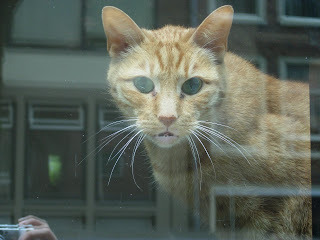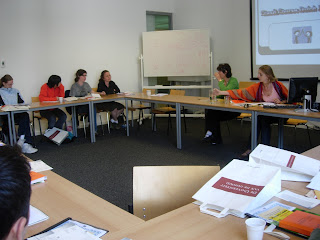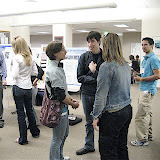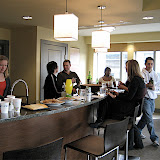BEGIN.
Thanks for your time today; I enjoyed it, even with the vertigo attendant upon compressing 15 years of study into 1 hour of talk. What I'd like you to take from the time is:
1. Under the rubric of modernity, selves/subjects and environments/objects are in mutual, and mutually constitutive, relation. Ex: Agoraphobes were "invented" in the 19th century in that sense by the spaces they inhabit.
2. Always historicize. The range of history at stake will differ, from centuries to days (yikes). Ex: The flâneur gave us the urban anthropologist. Emotions or affects are not simply transhistorical experiences: 21st century students experience boredom; 16th century monks and nuns are sinners, having indulged in/succumbed to either acedia or aboulia: the technical sin of will-lessness.
3. The everyday is an archive: one's clothing, a city street, Vogue magazine, graffiti are all means by which a culture generally and a society specifically bears out its intentions, ideals, and repressions.
4. Fashion is systemic—the fashion system dictates what you wear—but qua style--in the sense of an individual's "enunciation"-- it is a tactic, and perhaps a means of resistance to the system in which is it (doomed to be) embedded. I mean "enunciation" to refer to the conscious or unconscious exercise of choice regarding what one wears. We perform our bodies, speaking them as one does a sentence, with intention, ambiguity, and the problematics of reception (does someone read you right?) imported wholecloth. N.B.: I say conscious performance because babies and small dogs do not have style: they are regarded as objects by the fashion system: prosthetic extensions of their owners' sensibilities. This is why Upper East Side Ladies from Manhattan carry small dogs in their purses, and the 30 year old teenager sitting across from you on the #49 bus in Capitol Hill has adorned his dog's neck with a tattered bandana.
The question that seemed to be on the table at the end of our talk was the role of irony in terms of collaborative and personal enunciation. I found myself arguing that irony could be read at the individual (personal) level—in this case clothing--rather than the collaboratively engineered level—in this case public space. I.e., an instance of sartorial fashion could manifest irony, whereas a building would not. I remain unconvinced that an instance of public space can be rendered ironically, although Clifford raised the terrific instance of deconstruction as an architectural style… But here's what to do:
ASSIGNMENT
Reading (and Blogging) the Body: A Sartorial Exercise
"It is only superficial people who do not judge by appearances." –Oscar Wilde
"I got my brand new fetching red leather jacket on." –Rufus Wainwright
Write a 600 word or so account of what you wore to class on 23 April. (If you didn't make it to class, what did you wear between 3.30-4.50 PST?) "What you wore" includes the following: the clothing, accessories, and any other means of adorning the body in a means visible to a third party. We do not need to know about underwear, or for that matter its absence.
--This exercise divides into two parts.--
I. Part one is to be a third person, objective rendering of the terrain (i.e., you) rendered in as neutral terms as possible. Adopt the perspective of a third party, torqued toward the language of anthropology, sociology, literature, or case study--whatever set of rhetorics with which you are comfortable, or with which you wish to become comfortable.
II. Part two is to be written in the first person. It may or may not be a direct reply to part one. You may wish to pay particular attention to the following:
A. Account of motivation behind general or particular choices made or factors in terms of what you wore (I hadn't done my laundry, so my outfit was wrinkled, having been recycled from the closet floor earlier that morning)
B. Significance of (Acquisition of) clothing, accessories, etc.: If a particular aspect of your style bears remark, this is the place to do it.
EXAMPLE
I'll go first, prompted by the wonderfully invasive question leveled at me today.
Subject: Visiting professor. Sex: Female. Age: Uncertain [indulge me]. Race: Caucasian. Religion: No visible markers thereof. Red string on right wrist may indicate adherence to Judaic Kabbalah, although a female's adoption thereof suggests some level of irony in, play regarding, or secularization of religious orthodoxy.
Clothes: Subject wore pants and shirt. Both shirt and pants were oversized in regard to subject's bodily frame. Both appeared to be of natural or natural appearing fabric: e.g. cotton, linen. Shirt was marketed for males: evident from buttons present on the right, rather than the left (as is primarily the case for mainstream women's garments). Shirt was unbuttoned until second button, allowing display of necklace (see below). Shirt sleeves were buttoned at cuffs, and unbuttoned at forearms. While primary effect was monochromatic, with the absence of any overt design or pattern on clothing, pants were a dark midnight blue. This may or may not indicate aesthetic discrimination (subtle contrast of colors) or failure (pants and shirt do not match) on the subject's part. Clothing, while loose, was kempt: no stains, wrinkles, or alterations were visible.
Hair was cut short, and presumably untreated by color given the subtle [indulge me] occurrence of grey hairs. While short hair generically indicates a certain level of maintenance—for it would not otherwise be short—the precise degree of maintenance was indeterminate. No hair accessories or overt modification (barrette, pick, part).
Bodily accessories include aforementioned red string, a silver-colored necklace featuring chain and pendant, an absence of earrings (marked, given that ears were pierced), and while no tattoos were visible, the subject appeared in class with writing on her right hand (suggesting subject is either left handed or ambidextrous). Overt brandification was limited to the logo present on shoes: black and white trainers were branded with "Jack Purcell/Converse" logo. Shoes were laced, and double-tied.
Given the presence of masculinist and gender neutral garb (see shirt above; the absence of makeup as accessory, and the ambiguous red string) the subject seems to be relatively unconstricted in any adherence to strict notions of clothing as a normative indicator of gender. In the context of the site—that is, not only speaking before but introducing herself to a class, and one ultimately focused on the body and fashion—the clothing must be read performatively.
Part 2.
I thought a fair amount about what I was going to wear to your class. I am teaching a graduate seminar this quarter on fashion and modernism on Tues/Thurs; it's very intense, and while I typically dress carefully when I'm teaching (that is, on the days that I have class), when I teach a class on clothing, I am especially conscious of my decisions. But I met with you on Monday, not a teaching day, and so I was not in High Professor Mode. I was coming into your class and talking, but I very deliberately chose not to adopt the persona of the one adjudicating the proceedings. In that mode, I'm aware of being a professor who's just been awarded tenure and promotion, and so this year I'm far more cavalier about what I allow myself to be seen wearing on campus. Prior to this year the only pair of pants I would have worn into a classroom were my pinstripe Armani trousers. This year, I am far more relaxed and ironic—to use the language we began to play with today—about my sartorial choices.
So: my black shirt is a man's DKNY I found at Goodwill for cheap, and regularly pair with generic dojo workout pants when I'm going to the gym after campus, as I did after class. I suppose I wanted to err on the side of the casual, since usually as a professor I err on (or lean to) the side of the hyper-professional. My talk with you reflected this.
The humanities is very subject to identity politics—how what you teach may be read to intersect with who or what you "are"—and today's clothing's gender play indulges this. I like to think it is either blandly innocuous (not distracting to someone who is trying to understand an intellectual argument) or a uniform.
I am horribly attuned to jewelry--my own and others. Freud would read this as yet another indicator of fetishism and/or the castration complex (females born un-penised; the perception of lack leads to the focus on bodily adornment as a mode of compensation, or some such rhetoric). I've never bought this (literally or metaphorically). I read fashion and adornment as modes of expression and with that creativity. Typically I wear a ring or two, and earrings, but today I only wore a necklace I've had for 10 years that displays the Sanskrit for what I colloquially gloss as Relax, Kid. One of the things I love about being an academic is the freedom that comes with it, and I play with such symbols, periodically adopting them as talismanic and then relinquishing them. The red string is personal, and evolving; it's not something I care to explicate here, but of course insofar as I wore it I draw attention to the fact that I wish not to discuss it. Don't take that personally. I look forward to reading your offerings. Best, JB
END
 For the UW students, this conference was the culmination of research conducted in Amsterdam for the study abroad program titled: Pragmatic Tolerance & Urban Culture in Amsterdam: Interdisciplinarity research with the use of e-research practices. Presentations were divided into three thematic clusters based on methodological approaches to research.
For the UW students, this conference was the culmination of research conducted in Amsterdam for the study abroad program titled: Pragmatic Tolerance & Urban Culture in Amsterdam: Interdisciplinarity research with the use of e-research practices. Presentations were divided into three thematic clusters based on methodological approaches to research.



























